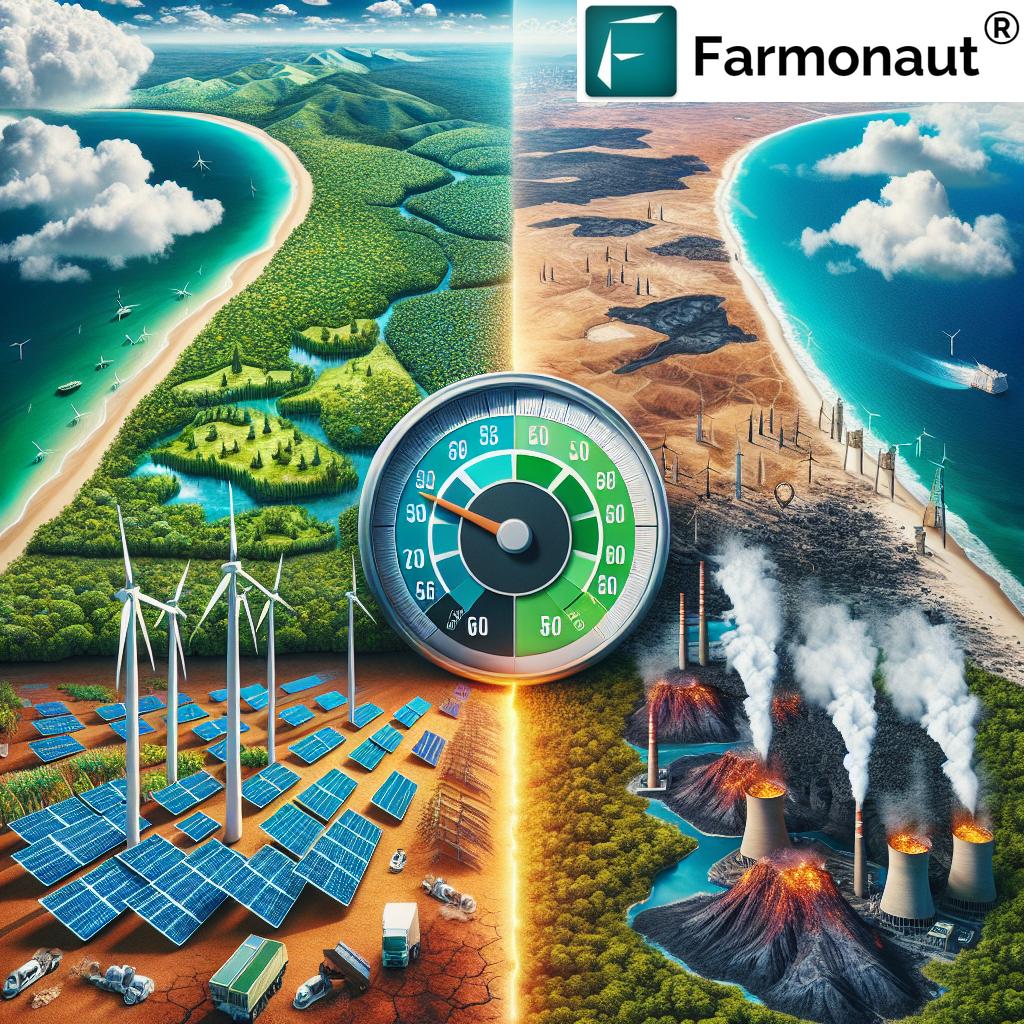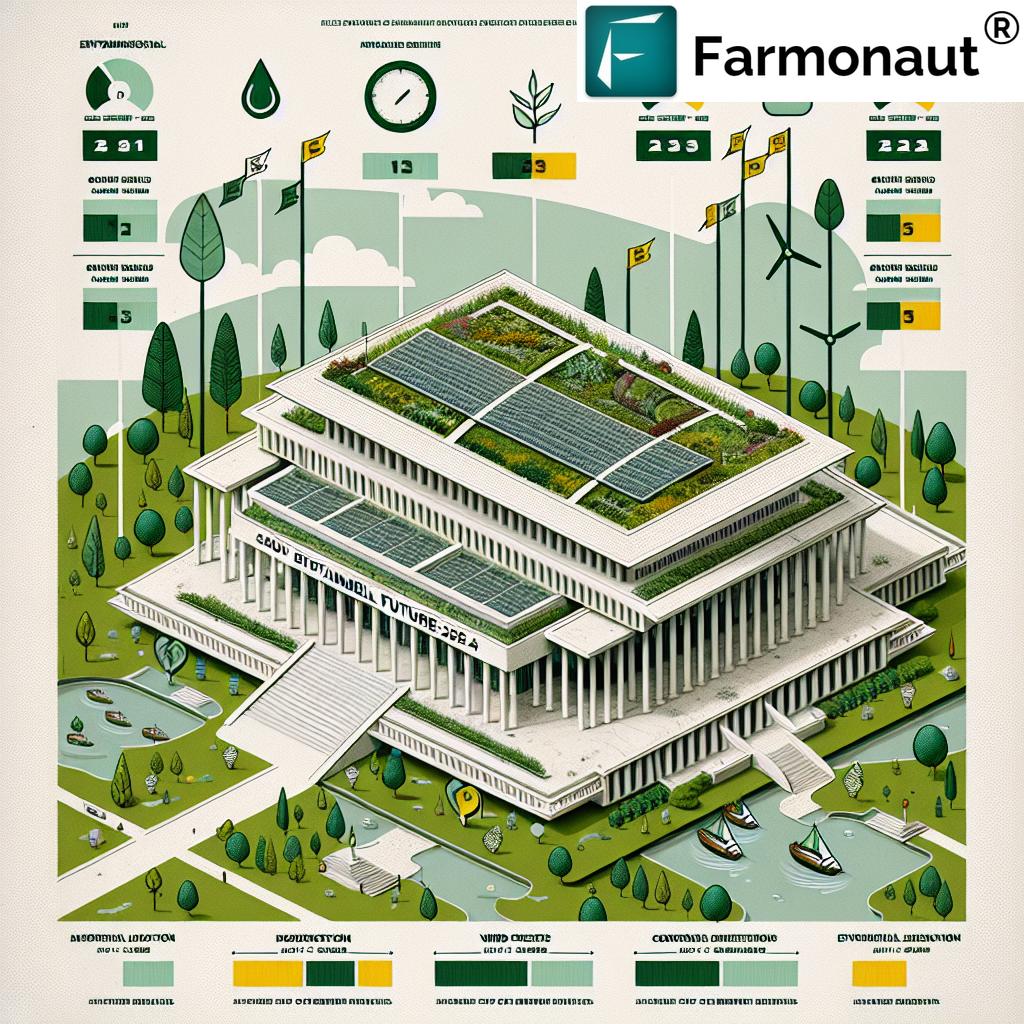Sustainable Australia: Climate Change Policies and Environmental Scorecard for 2023 Federal Election
“Both major Australian political parties scored below 50% on a recent climate and environment policy assessment for the 2023 federal election.”
As we approach the 2023 federal election in Australia, the spotlight is firmly on climate change policies and environmental performance. Our nation stands at a crucial crossroads, with the decisions made in this election potentially shaping our environmental future for decades to come. In this comprehensive analysis, we’ll delve into the climate change policies, environmental scorecards, and the broader implications for sustainable development in Australia.
The Current State of Australian Climate Change Policies
Australia’s approach to climate change has been a subject of intense debate and scrutiny in recent years. As a nation heavily reliant on fossil fuels and vulnerable to the impacts of climate change, our policies have often been criticized for lacking ambition and urgency. Let’s examine the current landscape:
- Emissions Reduction Targets: Australia has committed to reducing greenhouse gas emissions by 26-28% below 2005 levels by 2030. However, many experts argue this target is insufficient to meet our obligations under the Paris Agreement.
- Renewable Energy: While renewable energy adoption has been growing, Australia still lags behind many developed nations in transitioning away from fossil fuels.
- Kyoto Protocol: Australia’s stance on the Kyoto Protocol has been contentious, with debates around carbon credits and emission accounting methods.
These policies form the backdrop against which the major political parties are presenting their environmental platforms for the upcoming election.
Environmental Scorecard: Assessing the Major Parties
The Australian Conservation Foundation (ACF) has released its first assessment of the main political parties’ climate and environment policies. This scorecard provides valuable insights into how each party measures up on crucial environmental issues.
| Party | Climate Action | Water Conservation | Sustainable Cities | Overall Score |
|---|---|---|---|---|
| Liberal/National Coalition | Low | Moderate | Low | <50% |
| Labor | Moderate | Moderate | Moderate | <50% |
| Greens | High | High | High | >75% |
| Democrats | High | High | Moderate | >60% |
| Family First | Very Low | Low | Low | <25% |
This scorecard reveals a concerning trend: both major parties, the Liberal/National Coalition and Labor, have scored below 50% in their overall environmental performance. This raises significant questions about their commitment to addressing climate change and environmental issues.
Key Environmental Issues in the 2023 Federal Election
As we delve deeper into the parties’ policies, several key issues emerge as central to the environmental debate:
1. Climate Action and Emissions Reduction
The cornerstone of any effective environmental policy is a robust plan for reducing greenhouse gas emissions. Here’s how the major parties stack up:
- Liberal/National Coalition: Committed to a 26-28% reduction in emissions by 2030, relying heavily on technological solutions.
- Labor: Promises a more ambitious 43% reduction by 2030, with a focus on renewable energy investment.
- Greens: Advocate for a 75% reduction by 2030 and net-zero emissions by 2035.
The stark differences in these targets reflect the varying levels of urgency each party attributes to the climate crisis.
2. Renewable Energy Targets
Transitioning to renewable energy is crucial for reducing Australia’s carbon footprint. The parties’ positions on this issue are as follows:
- Liberal/National Coalition: No specific renewable energy target, focusing instead on a “technology-neutral” approach.
- Labor: Aims for 82% renewable energy in the national electricity market by 2030.
- Greens: Proposes 100% renewable energy by 2030 and significant investment in green hydrogen.
These divergent approaches highlight the ongoing debate between gradual transition and rapid transformation in our energy sector.
3. Water Conservation and Management
In a continent as dry as Australia, water management is a critical environmental issue. The parties’ policies on water conservation include:
- Liberal/National Coalition: Focuses on water infrastructure projects and support for irrigators.
- Labor: Promises to restore the Murray-Darling Basin Plan and increase urban water security.
- Greens: Advocate for stricter regulations on water use and protection of river systems.
The management of our water resources will be crucial in adapting to a changing climate and ensuring sustainable agriculture.

4. Sustainable Cities and Urban Development
With the majority of Australians living in urban areas, sustainable city planning is essential. The parties’ approaches to this issue vary:
- Liberal/National Coalition: Emphasizes infrastructure investment and city deals.
- Labor: Proposes a National Urban Policy Framework and increased funding for public transport.
- Greens: Advocates for green spaces, sustainable housing, and improved public transport networks.
The development of sustainable cities will play a crucial role in reducing our overall environmental impact and improving quality of life.
The Role of Technology in Environmental Solutions
As we grapple with these environmental challenges, technology is emerging as a crucial tool in our arsenal. Innovative solutions are being developed to address issues ranging from climate monitoring to sustainable agriculture.
One such technology that’s making waves in the agricultural sector is satellite-based farm management. Companies like Farmonaut are at the forefront of this revolution, offering advanced solutions that combine satellite imagery, AI, and blockchain technology to promote sustainable farming practices.
Farmonaut’s platform provides real-time crop health monitoring, AI-based advisory systems, and resource management tools. These technologies enable farmers to make data-driven decisions, optimize resource use, and reduce their environmental impact.
By leveraging such technologies, we can work towards more sustainable agricultural practices, which is crucial in the context of climate change and environmental conservation.
The Kyoto Protocol and Australia’s International Commitments
Australia’s stance on the Kyoto Protocol has been a point of contention in the environmental debate. Let’s examine the positions of the major parties:
- Liberal/National Coalition: Has historically been skeptical of the Kyoto Protocol, arguing for more flexibility in emissions reduction approaches.
- Labor: Committed to ratifying the Kyoto Protocol and supporting international climate agreements.
- Greens: Strongly advocate for adherence to international climate agreements and push for more ambitious targets.
The debate around the Kyoto Protocol reflects broader questions about Australia’s role in global climate action and our responsibilities as a developed nation.
Forest Conservation and Biodiversity
Australia’s unique ecosystems and biodiversity are under threat from climate change and habitat destruction. The parties’ approaches to forest conservation include:
- Liberal/National Coalition: Focuses on sustainable forestry practices and funding for threatened species.
- Labor: Promises to end broad-scale land clearing and increase protected areas.
- Greens: Advocate for an end to native forest logging and significant expansion of national parks.
The protection of our forests and biodiversity is crucial not only for conservation but also for their role in carbon sequestration and climate regulation.
“Climate change has emerged as a significant consideration for Australian voters, influencing the 2023 federal election campaign.”
The Impact of Climate Change on Australian Agriculture
Climate change poses significant challenges to Australian agriculture, a sector vital to our economy and food security. Rising temperatures, changing rainfall patterns, and extreme weather events are already impacting crop yields and livestock production.
In this context, innovative agricultural technologies are becoming increasingly important. Farmonaut’s satellite-based farm management solutions offer valuable tools for farmers adapting to these challenges:
- Crop Health Monitoring: Real-time satellite imagery helps farmers detect issues early and optimize crop management.
- AI-Driven Insights: Advanced algorithms provide personalized recommendations for resource use and crop planning.
- Water Management: Precise soil moisture data enables more efficient irrigation practices.
Farmonaut’s API allows developers and businesses to integrate these powerful tools into their own systems, further expanding the reach of sustainable farming practices.
By embracing these technologies, Australian farmers can improve their resilience to climate change while contributing to overall emissions reduction efforts.
The Role of Renewable Energy in Australia’s Future
Transitioning to renewable energy is crucial for reducing Australia’s carbon emissions and ensuring a sustainable future. The debate around renewable energy targets is a key point of differentiation between the parties:
- Liberal/National Coalition: Supports a mix of energy sources, including continued use of fossil fuels alongside renewables.
- Labor: Aims for 82% renewable energy in the national electricity market by 2030.
- Greens: Advocates for 100% renewable energy by 2030 and significant investment in storage technologies.
The shift to renewable energy presents both challenges and opportunities for Australia. While it requires significant infrastructure investment, it also has the potential to create new jobs and industries.
Nuclear Power: A Contentious Issue
The debate around nuclear power in Australia has resurfaced in recent years as a potential low-emission energy source. The parties’ stances on this issue are as follows:
- Liberal/National Coalition: Has shown openness to considering nuclear power as part of Australia’s energy mix.
- Labor: Opposes the development of nuclear power plants in Australia.
- Greens: Strongly opposes nuclear power, advocating instead for renewable energy sources.
The nuclear debate highlights the complex trade-offs involved in energy policy and the need for careful consideration of all options in addressing climate change.

The Importance of Sustainable Urban Development
With the majority of Australians living in cities, sustainable urban development is crucial for reducing our environmental impact. The parties’ approaches to this issue include:
- Liberal/National Coalition: Focuses on infrastructure investment and city deals to improve urban livability.
- Labor: Proposes a National Urban Policy Framework and increased funding for public transport.
- Greens: Advocates for green spaces, sustainable housing, and improved public transport networks.
Sustainable urban development not only reduces environmental impact but also improves quality of life for city dwellers.
The Role of Individual Action in Environmental Conservation
While government policies are crucial, individual actions also play a significant role in environmental conservation. Here are some ways Australians can contribute:
- Reducing energy consumption and switching to renewable energy sources
- Adopting sustainable transportation methods
- Supporting sustainable agriculture through informed consumer choices
- Participating in local conservation efforts
Technologies like Farmonaut can help individuals make more informed choices about the food they consume by providing transparency in agricultural practices.
The Economic Implications of Climate Change Policies
The debate around climate change policies often centers on their economic implications. Critics argue that aggressive climate action could harm Australia’s economy, particularly sectors reliant on fossil fuels. However, proponents of strong climate policies point to the economic opportunities in renewable energy and green technologies.
The parties’ approaches to balancing environmental and economic concerns differ:
- Liberal/National Coalition: Emphasizes a “technology-led” approach to emissions reduction, aiming to minimize economic disruption.
- Labor: Proposes significant investment in renewable energy, arguing it will create new jobs and industries.
- Greens: Advocates for a rapid transition away from fossil fuels, coupled with programs to support affected workers and communities.
The challenge lies in finding a path that addresses environmental concerns while ensuring economic prosperity and job security for all Australians.
The Role of Innovation in Environmental Solutions
Innovation and technology will play a crucial role in addressing environmental challenges. Companies like Farmonaut are at the forefront of this innovation, developing solutions that combine cutting-edge technology with environmental sustainability.
Farmonaut’s platform demonstrates how technology can be leveraged to promote sustainable practices:
- Precision Agriculture: By providing detailed, real-time data on crop health and soil conditions, Farmonaut enables farmers to optimize resource use and reduce waste.
- AI-Driven Insights: Advanced algorithms analyze satellite data to provide personalized recommendations, improving farm productivity while minimizing environmental impact.
- Blockchain Traceability: This technology ensures transparency in supply chains, promoting sustainable and ethical farming practices.
These innovations highlight the potential for technology to drive environmental solutions across various sectors.
The Global Context: Australia’s Role in International Climate Action
Australia’s climate policies have implications beyond our borders. As a developed nation with high per capita emissions, our actions on climate change are closely watched by the international community. The parties’ approaches to international climate action include:
- Liberal/National Coalition: Emphasizes Australia’s right to set its own targets, focusing on regional cooperation.
- Labor: Commits to stronger engagement with international climate agreements and forums.
- Greens: Advocates for Australia to take a leading role in global climate action, pushing for more ambitious international targets.
Our stance on international climate action will shape not only our environmental future but also our diplomatic and trade relationships.
Conclusion: The Path Forward for Sustainable Australia
As we approach the 2023 federal election, the environmental policies of our major parties will play a crucial role in shaping Australia’s future. While the current scorecard shows room for improvement across the board, it’s clear that climate change and environmental issues are becoming increasingly important to Australian voters.
The path to a sustainable Australia requires a multi-faceted approach, combining strong government policies, technological innovation, and individual action. As we’ve seen, companies like Farmonaut are leading the way in developing solutions that promote sustainability in crucial sectors like agriculture.
As voters, we have the power to shape Australia’s environmental future through our choices at the ballot box. By critically examining the environmental policies of each party and considering their long-term implications, we can work towards a more sustainable and resilient Australia.
FAQs
- What are the main differences in climate policies between the major Australian parties?
The main differences lie in their emissions reduction targets, renewable energy goals, and approaches to international climate agreements. The Liberal/National Coalition tends to favor a more gradual approach, while Labor and the Greens advocate for more ambitious targets and rapid transition to renewables. - How does Australia’s climate policy compare to other developed nations?
Australia’s current climate policies are generally considered less ambitious than many other developed nations, particularly in terms of emissions reduction targets and renewable energy adoption. - What role can individuals play in addressing climate change in Australia?
Individuals can contribute by reducing energy consumption, choosing sustainable transportation options, supporting sustainable agriculture, and participating in local conservation efforts. - How might climate change policies affect Australia’s economy?
The economic impacts of climate policies are debated. While some argue strong climate action could harm certain industries, others point to economic opportunities in renewable energy and green technologies. - What is the Kyoto Protocol, and why is it significant for Australia?
The Kyoto Protocol is an international treaty that commits state parties to reduce greenhouse gas emissions. Australia’s stance on the protocol has been a point of contention in climate policy debates.
Earn With Farmonaut
Earn 20% recurring commission with Farmonaut’s affiliate program by sharing your promo code and helping farmers save 10%. Onboard 10 Elite farmers monthly to earn a minimum of $148,000 annually—start now and grow your income!
Farmonaut Subscriptions







